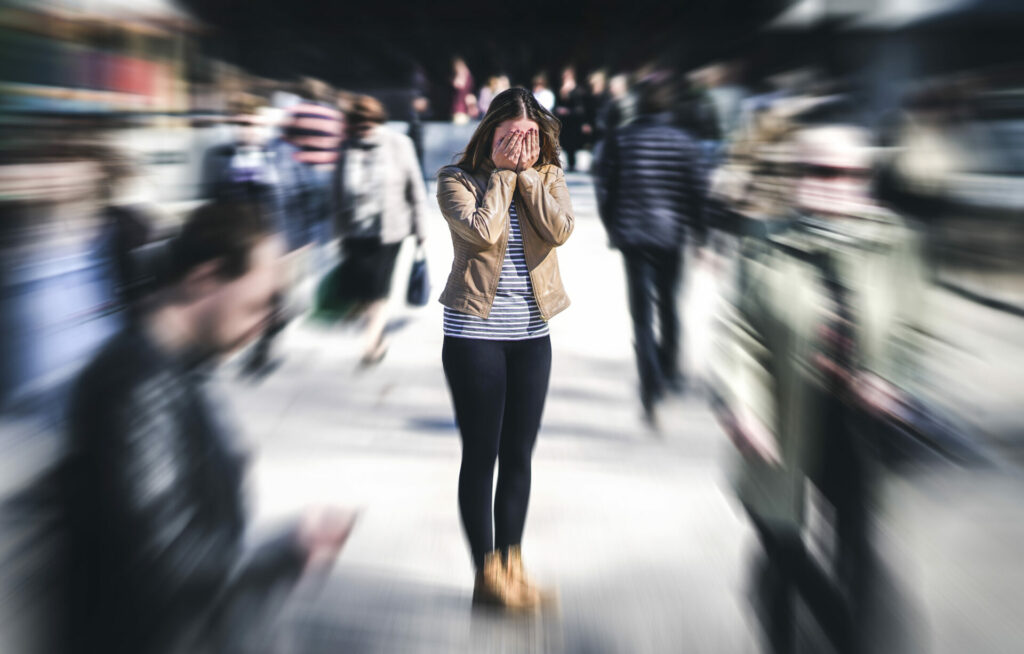Charlotte is one of her company’s rising young stars. A lawyer since she graduated, she’s being fast-tracked for promotion and is awarded every bonus going. Yet she spends most of the weekend and the last few days of every holiday dreading going back to the office. The reason? She feels she doesn’t fit in with the high-flyers she works with.
‘I feel like an outsider because I’m not a ruthless, workaholic,’ confesses Charlotte, 24. ‘I like my job and I’m good at it but I think there’s more to life. My colleagues are in the office until midnight but I want to leave on time for my yoga class.

‘I don’t want to network 24/7 and I won’t step all over people to get to the top. My colleagues think I’m soft while I’m just kind and they don’t invite me out anymore as they say they’ll only talk about work and it’s obvious I’m not that interested. It’s horrible being excluded though.’
The Outsider
Experts say Charlotte isn’t alone, and most of us feel like a square peg in a round hole at some time or other. Some of the most famous and successful people in history have experienced this. The physicist Albert Einstein and painter Vincent van Gogh confessed to feeling like outsiders. Billy Elliott and Mamma Mia! actress Julie Walters and US TV presenter Oprah Winfrey have admitted they felt they didn’t fit in at different times of their lives.
Whether it’s in the school yard, at university, the office, as a parent at the school gate, in our friendship groups or even with our own family, we all sometimes feel as if we’re on the outside looking in. Or we’re left off party lists, not asked on the ski-ing or theatre trip and side-lined when sports or quiz teams are chosen.
Tanya Sibley, a certified hypnotherapist practitioner, who is based in Abu Dhabi, says there is a multitude of reasons why one person might feel they don’t fit in – from not having the ‘right accent’, sharing the same values, or coming from a different country, culture or background.
‘When we feel we don’t fit in, we suffer a lack of confidence and anxiety. We second guess ourselves and we feel vulnerable. It’s a vicious circle because you stop putting yourself out there to be invited and included’
‘Everyone came onto this planet with an innate sense of confidence,’ she explains. ‘As we grew, this confidence got chipped away, whether that’s from faulty parenting, a teacher, a peer or friends. Children are so suggestible and they’re not able to think logically or rationalise. It’s easy for them to develop beliefs of not fitting in or being good enough early on.’
In his 1943 paper, A Theory of Human Motivation, psychologist Abraham Maslow listed social belonging as one of our essential needs, along with food, water, sleep and safety. These needs track back to our ancestry as tribesmen and women.
Tanya continues: ‘Back in tribal times, men would go hunting in a group as working in a pack meant it was easier to catch food. Women stayed together as being in a group meant better protection in the face of danger.
‘Although we live in a very modern world, we still have these tribal needs. We still have an intense need to feel connected and to maintain connection. When these bonds are threatened, we instantly feel our sense of belonging has been impacted.’
She says a human’s greatest fear is being rejected. ‘When you feel rejected, the body can’t distinguish between fear or excitement so you get a fight or flight response,’ Tanya explains. ‘Your breathing gets quicker and your start questioning yourself and developing negative thoughts.

‘We call this The Looping Thought Pattern. For example, if you were asked to do a presentation to a large audience at work but you have a fear of public speaking, your thoughts might be: ‘I’m not smart enough. Everyone will laugh at me. I’ll mess up. I’m not good enough.’
‘You start to feel sick, scared and embarrassed. You then try to get out of doing the presentation by claiming to be unwell, hiding away, not attending the event or even leaving the job.’
Lucy Lloyd, a UK-based hypnotherapist who also practises Rapid Transformational Therapy all over the world, says that we needed to fit in historically to survive. ‘We are hard-wired to seek out our own tribe so that we can feel safe and secure,’ she says.
‘When we feel we don’t fit in, we suffer a lack of confidence and self-worth, and anxiety. We second guess ourselves and we feel vulnerable because we don’t have people to back us up. It’s a vicious circle because once you feel you don’t fit in, you lose confidence and you stop putting yourself out there to be invited and included.

‘Physically, feeling left out can affect your heart health. Elevated fight-or-flight hormones can also compromise our immune system which helps us fight illness.’
So how can we get ourselves back in the in-crowd without pushing to be included and appearing over-needy?
Face some truths
‘You must realise you’re not going to connect with everyone,’ points out Lucy. ‘Someone who is spiritual and loves yoga isn’t likely to connect with people who love to sit at home playing video games. Be realistic and don’t expect the impossible.’
Find your tribe
Work out what makes you happy, be that walking, painting, dancing or meditation, and join groups of people who love the same things or link up with friends with similar interests.
‘It’s about being honest about what you really love doing, not what you feel you should love doing, and then going out and finding people that are similar,’ says Lucy. ‘If you love dancing, join a class or head to a salsa club.’
Keep going
Once you have your community, don’t give up easily. ‘Even within your niche group, you won’t bond with everyone,’ Lucy says, ‘so keep going until you find some people you get along with. You will make friends and your confidence will grow, but it won’t happen immediately. Think of how we treat children who don’t want to go to school – we encourage them to keep going.’
Let go of negative people
Focus on positive relationships and minimise your interactions with negative people, suggests Tanya.
‘In 2017, Harvard did a study on The Secret to Happiness and it found a strong association between happiness and close relationships, like spouses, family, friends and social circles,’ she says, adding that personal connection was found to be a mood booster, while isolation was a mood buster.
Choose a healthier lifestyle
Exercise to create happy hormones, recommends Tanya. ‘Whether you do cardio workouts, Pilates or CrossFit at the gym, you’ll release happy endorphins which are proven to reduce stress,’ she says. ‘When you exercise, you’re likely to eat healthier foods and sleep better, both of which play a role in longevity and happiness. Better still, join an exercise class! You’ll be among other people and you’ll develop confidence and will make friends.’
Try hypnotherapy
Both Lucy and Tanya are certified Rapid Transformational Therapists and their treatment includes a session of hypnotherapy to rewire our thinking and stop us feeling like an outsider.
Lucy says: ‘In my work, I’ve regressed people who felt they didn’t fit in and they often went back to their childhood. They may have gone to a birthday party where all the other kids played with each other and didn’t talk to them. Some reveal they were bullied in the school playground. In hypnosis, we remove the old belief and put in a new one.’
Tanya adds: ‘It’s my job to fix the root issue of someone’s behaviour fast and to get clients to understand where, why, when they developed the issue and why it’s playing this role in their lives today. Understanding is power and when you understand why you are acting or behaving in a certain way, you can then break that chain and start living your life to its fullest.’













